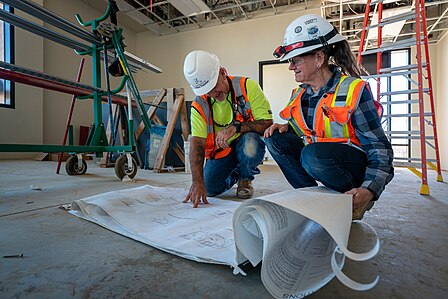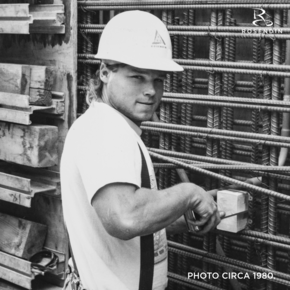| A major contributor to this article appears to have a close connection with its subject. It may require cleanup to comply with Misplaced Pages's content policies, particularly neutral point of view. Please discuss further on the talk page. (June 2024) (Learn how and when to remove this message) |
| Company type | Private |
|---|---|
| Industry | Construction |
| Founded | 1919 |
| Founder | Moses Rosendin |
| Headquarters | San Jose, California, San Jose, California, United States |
| Number of locations | AZ (Tempe, Phoenix); CA (Anaheim, Concord, Los Angeles, Sacramento, San Francisco, San Jose); HI (Aiea); MD (Hanover); ID (Boise); NC (Charlotte); NV (Reno, Las Vegas); OR (Hillsboro, Prineville); TN (Gallatin); TX (Austin, Pflugerville, Temple); VA (Sterling) |
| Key people | Keith Douglas, CEO Hank Brasch, CAO Axelle Giradot, CSO Matthew Hisaka, CFO |
| Revenue | $2.9 Billion USD |
| Owner | Employee Owned |
| Number of employees | 7,000+ |
| Website | rosendin.com |
| Footnotes / references INC, Rosendin (2019, January). Rosendin History. Rosendin Electric. | |

Rosendin, headquartered in San Jose, is employee-owned and one of the largest electrical contractors in the United States, employing over 7,500 people with an average annual revenue of $2.9 billion. Established in 1919, Rosendin remains proud of their more than 100 years of building quality electrical and communications installations and value for their clients but, most importantly, for building people within their company and communities. At Rosendin, they provide opportunities for everyone to reach their full potential by creating a diverse, safe, welcoming, and inclusive culture.
Offices are located in AZ (Tempe, Phoenix); CA (Anaheim, Concord, Los Angeles, Sacramento, San Francisco, San Jose); HI (Aiea); MD (Hanover); ID (Boise); NC (Charlotte); NV (Reno, Las Vegas); OR (Hillsboro, Prineville); TN (Gallatin); TX (Austin, Pflugerville, Temple); VA (Sterling).
Employee Stock Ownership
In 1992, the Rosendin family made the decision to sell the company to the employees of Rosendin. By 2000, the sale was complete and Rosendin's employees owned 100% of the company, creating an ESOP (Employee Stock Ownership Plan). ESOP retirement contributions come solely from the company, making it completely free for employees to become fully vested in the organization. The ESOP Trust receives contributions annually from Rosendin Holdings, and the amount depends on several factors, including salary and time spent at the company. After six years at Rosendin, Employees become 100% vested and are eligible to receive their share after retiring. As a result, Rosendin employee-owners have a financial interest in increased productivity, greater profits and improved efficiencies because they are contributing to growing their own value in the company.
History
In 1919, Woodrow Wilson was President of the United States, the average house sold for under $4,000, and Moses Rosendin, a World War I veteran and immigrant from Mexico, began Rosendin Electric Motor Works by wiring the first irrigation pumps in the vast, fruit-laden “Valley of Heart’s Delight,” now known as Silicon Valley (INC, Rosendin, Rosendin History 2019). After the rapid growth of the 1920s, the stock market crashed in 1929; that was also the year Moses and Martha's first son, Ray, was born, and a few years later, their second son, Louis. "My father had a small metal building behind our house and a basement where the accounting was done. My mother worked on the books. So that's my beginning of family life,” Louis Rosendin recalls his beginnings (INC, Rosendin, Rosendin 100th Anniversary 2020).
During World War II, Moses Rosendin expanded his business to accept contracts from the shipyards that sprang to life around the San Francisco Bay Area as he felt it was his duty as a United States citizen to help the country the best way he knew how (INC, Rosendin, Rosendin 100th Anniversary 2020). The end of World War II brought rapid commercial and industrial growth to the Santa Clara Valley and enormously expanded work for Rosendin. The company grew from eight employees in the late 1930s to ninety by the late 1950s (INC, Rosendin, Rosendin History 2019).

After three decades of growth, adversity, war efforts, and a booming economy like never before, Moses Rosendin fell ill. He could not return to work, so the business transferred ownership to his sons, Ray Rosendin (24 years old) and Louis Rosendin (21 years old) (INC, Rosendin, Rosendin 100th Anniversary 2020). "The men and women who worked together with us during this difficult period, giving their advice and support, I hold in the highest esteem, having a debt of gratitude for the advice, service, and commitment they gave to me and my brother, and the company," Ray Rosendin recalls the transition of ownership from his father to him and his brother (INC, Rosendin, Rosendin 100th Anniversary 2020). In 1953, Rosendin won their first million-dollar project: Fresno State College, signaling growth for the organization.
In the 1970s and 1980s, Rosendin began doing more significant work, such as malls, department stores, high-rise buildings, and large-scale projects, building its reputation in central California (INC, Rosendin, Rosendin 100th Anniversary 2020). In 1989, the 6.9-magnitude Loma Prieta earthquake hit the California Bay area, causing significant damage to the San Francisco-Oakland Bay Bridge (INC, Rosendin, Rosendin History 2019). The section of the bridge that collapsed landed on a transformer below, and Rosendin assisted in getting the bridge back to operational status and took that transformer, lowered it to a barge, and craned in a new transformer (INC, Rosendin, Rosendin 100th Anniversary 2020). The bridge was opened in time for Thanksgiving weekend.
In the late 1970s, Ray Rosendin began planning an exit strategy for himself and his brother to leave a thriving company in place. At this time, the Rosendin family decided to sell the company to the employees, making Rosendin an employee-owned company (INC, Rosendin, Rosendin 100th Anniversary 2020). Initially, the plan was to have the company fully transition to an ESOP in 2015, but Rosendin employees were so motivated and inspired that the transaction took place in 2000 (INC, Rosendin, Rosendin History 2019). During this time, Rosendin saw a shift in their culture. This gradual change led to a shared sense of ownership, creating a lot of excitement and more pride in what the organization has accomplished (INC, Rosendin, Rosendin 100th Anniversary 2020). Rosendin's work became more diversified taking on more projects in various sectors (INC, Rosendin, Rosendin 100th Anniversary 2020). Rosendin had seen success with wind farms, started building data centers, and performed much more design-build work. Rosendin’s employees took on an ownership mindset, creating even more success for the organization (INC, Rosendin, Rosendin 100th Anniversary 2020).

Since the employees took ownership, technology has advanced rapidly, and the size of projects grew exponentially, demanding a technologically advanced approach. Rosendin is now on the cutting edge of technology with a dedicated Building Information Modeling (BIM) team to keep up with the rapid technological changes in today’s environment (INC, Rosendin, Technology Innovation).
Rosendin now has a nationwide footprint with 7,000+ employees working across 18+ offices and a wide diversity of work from high-tech to renewables to data centers and healthcare.
References
- "INC, Rosendin". 2020-06-09.
- "Rosendin's 100th anniversary". YouTube.
- "INC, Rosendin (n.d.). Technology Innovation". Rosendin Electric.
- "Contact Us". Rosendin Electric. Retrieved 2024-06-06.
- List of employee-owned companies
- ^ "History". Rosendin Electric. Retrieved 2024-06-06.
- ^ Rosendin (2020-06-09). Rosendin 100th Anniversary. Retrieved 2024-06-06 – via YouTube.
- "Technology Innovation". Rosendin Electric. Retrieved 2024-06-06.